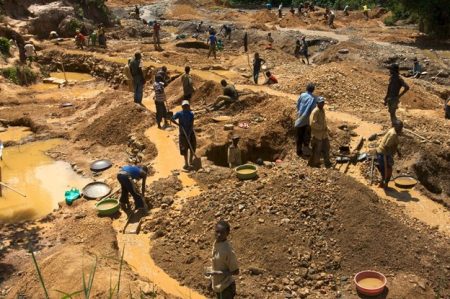11 August 2013, Lagos – The protracted controversy at the Aluminium Smelter Company of Nigeria, ALSCON, has taken a new twist as the Mboho Ikot Abasi community, the settlement which hosts the plant, protested an alleged destruction and sale of parts of the plant’s critical machinery by UC Rusal, the current management of ALSCON.
The development came at a time the outcome of the litigation between the Federal Government and BFIG Corporation over the real ownership of the ALSCON was still being awaited at the Supreme Court.
The community, in a letter dated August 2, and addressed to the Managing Director of the plant, Mr. Stanislav Kruglyashov, raised objection to Rusal’s cutting of Anode Stems and the proposed melting of their aluminum components for sale as ingots.
The indigenes also queried the sale of Stem Nipples to a standby contractor as well as the re-bagging of alumina and coke and dismantling of Electrical Busbar Assemblies for sale.
One of the Union leaders who spoke to THISDAY under conditions of anonymity said the development had been communicated to the Bureau of Public Enterprises, BPE, as well as Muhammad Dikko who is a member on the board of ALSCON representing the Federal Government.
Contacted over the development, BFIG Executive Vice-President, Public Relations, Mr. Frank Scherer, said it was “completely terrified and absolutely disturbed” and wondered how this could go on in the plant while there was a government representation on the board of ALSCON.
However, Rusal in a statement confirmed the cuttings but argued that the removal of the stem rods and other components was to the pave way for upgrade of existing technology at the plant.
But the explanation had been disputed as a mere cover up given the fact that Rusal’s economic prospects had been severely hurt by the lingering legal procedure to determine the rightful ownership of ALSCON following the Supreme Court ruling of July 6, 2012 which had nullified the eventual sale of ALSCON to the Russians who did not win the bid during the plant’s privatisation exercise in 2004.
BFIG, which had emerged the preferred bidder, was sidelined by former President Olusegun Obasanjo’s administration, while the plant was eventually given to the Rusal.
Earlier this year, Rusal had announced the suspension of aluminum production in the company, citing the uncertainty over the real ownership of the plant as a major source of worry.
It had further stated that prospects for new investment into the company had been severely jeopardised as a result of the lingering legal tussle.
It was further learnt that Rusal’s parent company back in Russian had stopped providing financial resources to ALSCON, a situation that may have prompted the sale of key machinery to meet financial obligation including payment of salary to staff.
The community, in the letter signed by its President General Donatus Uko and General Secretary Elder Genesis Udoh argued that Rusal’s latest actions were not in the best interest of the plant particularly in terms of its long-term profile.
It advised the management to suspend all the dismantling of the plants machinery in the interest of peace.
When contacted over the incident at the plant, Spokesman for the Bureau of Public Enterprises (BPE), Mr. Chigbo Anichebe, expressed doubt over the claim that the plant was being damaged but said an investigation would be launched to ascertain the true situation.
Anodes stems are aluminum components, which are critical for conveying materials to the Pot Room where aluminum is finally manufactured.
Scherer said the destruction of the stems “means you’ve crippled production.”
He said: “By the systemic destruction of these Anode Stems, the Russians want to ensure that no aluminum ingots would ever be produced again in Alscon especially because they stopped production about three months ago.”
James Emejo, This Day



